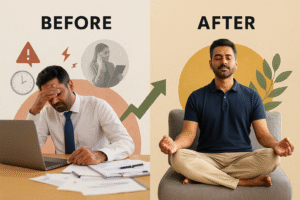It was 3:47 PM on a Thursday. My inbox glared back at me, full of unread emails. My heart raced, my shoulders locked, and I had re-read the same line five times without responding.
For weeks I had been running on coffee and deadlines, telling myself I just needed to “push harder.” But no matter how hard I pushed, the fog didn’t lift. I was exhausted, reactive, and on the verge of snapping at the next person who asked me for “just one more thing.”
That was the day I tried a 2-minute guided meditation during lunch. Nothing fancy, just breathing and noticing. Yet something shifted. My thoughts slowed, my chest loosened and for the first time that day, I felt… present.
Not to exaggerate—but that moment changed how I show up at work.
 People often mix up mindfulness and meditation, so let’s clear that up.
People often mix up mindfulness and meditation, so let’s clear that up.
Mindfulness is the skill of paying attention to the present moment, without judgment. It’s being fully aware of what you’re thinking, feeling, or sensing right now—whether you’re in a meeting or making tea.
Meditation is one way to practice mindfulness. Sitting quietly with your eyes closed, focusing on your breath, scanning your body, or repeating a mantra; all of these are forms of meditation. In other words, meditation is the workout; mindfulness is the fitness you build.
At work, mindfulness feels like switching off autopilot. You don’t stop flying—you just start flying with awareness.
Meditation isn’t about becoming a monk or escaping to the Himalayas (though that does sound tempting at 4 PM on a Friday).
Instead, it’s about training your mind to pause, focus, and reset—especially when the external world won’t slow down.
And this pause?
It’s powerful. Because it works in various ways:
Meditation has been studied for decades, and research consistently shows its powerful impact.

Harvard scientists discovered that regular meditation reduces activity in the amygdala—the brain’s “fear center”—while strengthening the prefrontal cortex, which handles rational decision-making. This shift helps reduce stress hijacks and improves clear thinking.
Meanwhile, MIT studies reveal that even short daily meditation sessions enhance working memory and cut down distractions. This makes it easier to notice when your mind drifts during a meeting and quickly refocus.
In Google’s well-known “Search Inside Yourself” program, employees who practiced mindfulness reported not only sharper focus but also greater empathy and resilience—qualities every workplace needs.
On top of that, consistent mindfulness practice lowers cortisol (the stress hormone), improves sleep quality, and strengthens the immune system, creating benefits that extend far beyond work.
Taken together, these findings echo what ancient traditions have long emphasized: inner calm fuels outer effectiveness.
The modern workplace is a minefield of distractions and emotional triggers. Meditation doesn’t eliminate these challenges—it changes how you respond to them.
1. Sharper Focus: Instead of drowning in 12 browser tabs and 3 Slack pings, meditation trains your mind to choose one thing at a time.
2. Emotional Regulation: You don’t snap at your colleague because of a late file—you pause, breathe, and respond with perspective.
3. Clarity in Decision-Making: Meditation clears the fog so you can tell urgent from important.
4. Resilience Under Pressure: You bounce back quicker after setbacks because your nervous system isn’t on constant overdrive.
At its core, meditation gives you freedom: the freedom to choose how you show up.
Think of your nervous system like a smartphone battery. Quick resets are your fast charges—they get you back up enough to function. Long-term practices are your overnight charge—they keep you strong and stable over time.
Both are essential. Quick resets keep you afloat in the moment. Long-term practice transforms who you are under pressure.
You don’t need incense or a Himalayan retreat to start. On the contrary, simple practices fit into any workday:
Moreover, you can combine both approaches. Quick resets recharge you instantly, while long-term practices build the “mindfulness muscle” that helps you stay present consistently.
Every 60 minutes, take your eyes off the screen, close them, and take 3 slow breaths. Notice what you’re feeling and thinking—without trying to change it. Do this for one day and observe the difference in your focus and energy.
Morning: A short sit before emails or screens helps set the tone for the whole day. Think of it as mental priming—like stretching before exercise.
Midday: When energy dips or meetings pile up, a 3-minute pause resets focus better than a second coffee.
Evening: A quick meditation before leaving work (or logging off) helps you shift gears and avoid carrying stress home.
Places: You don’t need a retreat space. An empty meeting room, your parked car, a terrace, or even a quiet corner with headphones can be enough. The “where” matters less than the intention.
Let’s get honest. Here’s how meditation helped real professionals we’ve worked with:
📉 Before:
🔁 After (just 10 days of guided meditation):
And no—we’re not talking about full-blown mindfulness retreats.
We’re talking 5 minutes between back-to-back meetings. That’s it.
In regions like India, the GCC, and Southeast Asia, hustle often overshadows health. But performance without presence leads to burnout, decision fatigue, and emotional overload.
Meditation flips that. It teaches that you don’t have to be always-on to be effective—you just have to be aware.
Some days you’ll forget.
Other days your mind will race.
Sometimes you’ll judge yourself.
That’s normal.
Because meditation isn’t about perfection.
It’s about returning—to presence, to breath, to yourself.
At The Yellow Spot, we believe meditation isn’t a “nice-to-have.”
It’s leadership hygiene.
Across India, the GCC, Singapore, and Southeast Asia, we’ve helped organizations integrate mindfulness at work—not with theory, but with real-life tools that stick.
Here’s what we bring:
Mindful Leadership Programs
For managers who want to lead with calm, clarity, and connection.
Emotional Wellness Workshops
To help teams manage stress, build resilience, and show up as their best selves.
Guided Meditation Experiences
Integrated into leadership journeys, offsites, and even virtual town halls.
Self-Coaching Reflection Tools
Build consistent, sustainable inner growth—even post-training.
Practice over preaching.
Tools instead of promises.
Self awareness beyond self relief.
In a world that glorifies busy, give your people the gift of balance.
📩 Reach out to us at info@theyellowspot.com or visit www.theyellowspot.com to explore our wellness-led leadership solutions.
Because when people feel centred inside, they create impact outside.
And that’s not just good for performance—it’s good for humanity.


Blue Arch CHS, Louis School Lane, Four Bungalows, Andheri West, Mumbai – 400053